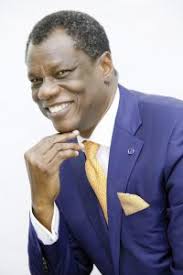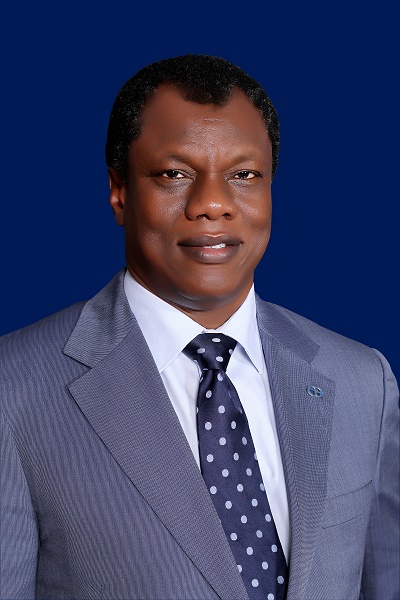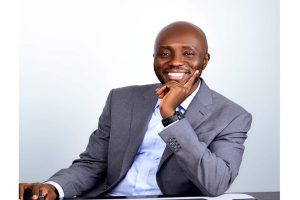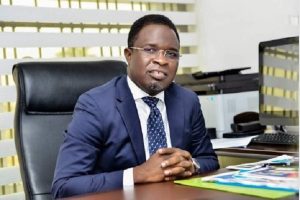Austin Okere, founder and vice chairman of Computer Warehouse Group Plc (CWG), has dual identity. He was, for more than two decades, identified with Information Communication Technology (ICT), an area in which his name rang a bell quite loudly. Along the line and satisfied that he had fulfilled a lifelong ambition of setting up and nurturing a small outfit into a major player in the ICT industry, he turned his gaze on leadership training. He can therefore be correctly said to be wearing two caps – an ICT professional and a leadership trainer.
A 1986 graduate of Computer Science from the University of Lagos, Okere ventured into the ICT industry as an entrepreneur in 1992 after a stint as a sales agent in a computer firm. It was a period when the computer industry was a sellers’ market, with many people longing to own computers that were not readily available, which explained why customers had to pay in advance to get supplies later.
As a sales agent, Okere was well paid, thanks to the fact that he also earned commission on the computers he sold, which helped to boost his income. But for a young man whose sense of business was hinged on the understanding that the customer is king, he felt uncomfortable having to explain to disappointed customers each time he could not keep his promise to deliver computers on agreed dates, after monies had been paid for them. He grew increasingly frustrated having to resort to a game of hide and seek with customers who would come looking for computers for which they had deposited money, sometimes up to 85 per cent, but which were not available because the boss had used the money for something else.
And when he took the bold step of faith to quit paid employment to plunge into the untested waters of entrepreneurship, his father and his (then) fiancé thought he was out of his mind. It seemed nonsensical for a young man with a promising future to quit a well-paid job at a time thousands of other school leavers were pounding the streets in search of jobs that were not available. But Okere had a dream. And the dream could only become a reality if he was in a position to make the customer feel he was truly the king.
Entrepreneurship, not a tea party
The first sign that entrepreneurship wasn’t going to be a tea party became obvious to Okere when customers who had known him where he worked earlier, whose trust he could bet on, and whom he thought would form the nucleus of his customers in his own company, gave him the cold shoulder. They had known the company he worked for. But that didn’t mean they would follow him wherever he went, even if where went was his own outfit, which they did not know. Organisations where he could walk in and walk out armed with cheques for orders refused to patronize him, because they did not know the new company he represented. It didn’t help matters for the new entrepreneur that he started off trying to market a brand that was relatively new in the market.
The big brands in computer then where Compaq, IBM and Hewlett Packard (HP). But those ones did not find a new entrant into the market an attractive partner to deal with, since they already had big and well established distributors in the country. Okere had to settle with Dell, a relatively new brand that was not popular in the country then.
Every disappointment is a blessing, according to the old saying. His partnership with Dell turned out to be more rewarding than he thought. The company did not just want a distributor in Nigeria; they wanted a company that would be Dell in operation and character, though another company in name. The company trained the staff of Computer Warehouse in its operations and business methods, making it seem as though it had a branch in Nigeria.

Computer Warehouse was trying to find its feet in Nigeria when the crisis that trailed annulment of the June 12 presidential election in 1993 set in, barely one year after it was established. It was a bad period for business, especially those operating in Lagos, the epicenter of the crisis.
Okere had no other choice than to shut down the company, with loans that he took to set it up running. He also had to pay employees that were not working, for fear that laying them off despite the huge cost of training them would mean that when the crisis was over, he would have start from the scratch, in terms of staff recruitment and training. But tough times don’t last; tough people do. And no matter the volume of the downpour, it would always be followed by sunshine.

As Okere had correctly predicted, the end of the June 12 crisis ushered in a period of boom for computer business. So good was business for Computer Warehouse that the losses it suffered during the crisis paled into insignificance. And as the world approached the turn of not just the century, but also the millennium, the company found itself literally swimming in lucrative businesses, as there was a rush by organisations, especially banks, to change to finacle – a new application that was replacing the one ones.
One important characteristic that is required for success in business, which Okere has in abundance and which has worked wonders for him, is trust. It is one characteristic that has opened doors for him, where others with little or none might have found the same doors closed in their faces. It takes more than superficial trust for a relatively unknown local player to be introduced by one foreign brand to another. This characteristic, which Dell found in Okere, encouraged it to introduce him to Oracle, another big international computer brand.
Near-victim of policy somersault
The good run of Computer Warehouse came close to being halted by a policy somersault that nearly sent it out of existence. The company had won a contract to supply a sepcialised IT equipment to Mobil, and it had to obtain a bank loan to import the equipment, because of its huge cost.
The equipment the company imported had already arrived Nigeria when the government announced a change of policy, from destination to source inspection. This meant that the equipment could not be allowed into the country, not having been inspected before leaving its source of departure for the country. It ended up in the shed of the National Aviation Handling Company (NAHC) at the Murtala Mohemmed Airport, Lagos.
At first Mobil showed understanding with Computer Warehouse over the dilemma it faced with the development. But the company also had its own business to do. It could not sympathise with Computer Warehouse forever. It lost patience after waiting for the computer company to sort out the mess in which it found itself, threatening to cancel the contract and re-award it to another company that would not be encumbered by government’s policy flip-flops.
A thoroughly downcast Okere walked out of the meeting at which he was issued the threat not knowing what to do or where to go. But a fortuitous meeting with an Air Force officer whom he knew when his company handled computerization for the Force brought Computer Warehouse back from the brink of extinction. With the man’s influence, the equipment was cleared from the NAHCO shed, and the company was able to deliver it when Mobil was about to cancel the contract.
“As a man thinketh in his heart, so also is he”, says a popular verse in the Bible.
In terms of size and name, Computer Warehouse was not in the same class with some of the companies that were playing in the big league that the computer industry was, then. But it positioned itself as one, and also acted as one. In no time, it began to get recognition as a big player, handling lucrative businesses for big corporations in the key sectors of the economy, like banking, oil and gas, and telecoms.
Diversification
Computer Warehouse started as a computer infrastructure company distributing and marketing hardware for the Dell brand. In not time, its performance won for it the position of foremost Dell enterprise partner in Nigeria and the computer brand’s main service provider in West Africa. But despite its soar away success, the company was not blind to the rapid changes that were taking place in the ICT industry around the world. It realized in time the urgent need to add more value to customers, beyond marketing of hardware.
The company went into managed services, providing the much needed skill for the management of clients’ businesses. It then moved into provision of cloud services to financial institutions, to promote financial inclusion, with the advent of mobile banking.
Its first cloud product, which it launched with MTN, was called MTN XaaS, software used by microfinance banks for servicing of customers. The choice of microfinance banks for the service was strategic, because the banks relate with the banking public at the grassroots.
The cloud services have provided banks with technology to serve the increasing number of customers, through financial inclusion. For instance, it is estimated that the technology has increased the percentage of the banking population from 30 per cent to 60 per cent.
The company’s second major product in this new line of business was the Diamond Y’ello Account, which enabled the bank to use the MTN platform to increase its customer base. From a projection of two million accounts in one year, the product enabled the bank to add six million new accounts in the same period. Soon, the company got signed on by other banks for similar products. But the biggest one was provision of similar services for small and medium scale enterprises in the country, about 200 in all.
Going public
Okere is fully aware of the fate that usually befalls privately-owned businesses in Nigeria after the death of their founders. He knows that the successful enterprises of some Nigerians who strode the country’s business terrain in the past would today compete with the big multinationals if their founders had seen the wisdom in allowing public ownership of those organisations. But because they did not follow that line of action, the present generation of Nigerians has probably never heard of the name of Henry Fajemirokun, or knows what legacy Aminu Dantata and M. K. O. Abiola failed to leave behind.
In 2013, Okere got the company, which had by then given birth to two subsidiaries – Expert Edge Software and Systems and DCC Satellite and Network Limited – to become the Computer Warehouse Group (CWG), listed on the Nigerian Stock Exchange. While Computer Warehouse Limited remains a hardware infrastructure solutions provider, Expert Edge Software and Systems handles systems application and deployment, providing software for financial institutions in the country. DCC Satellite and Network Limited partners local and international organisations in the provision of communications and networking solutions.
From being a local Nigerian company, CWG has become a big continental player, with branches in three other African countries, namely, Ghana, Cameroun and Uganda. The Group has six partners in Africa, with businesses covering 28 countries. It has an annual turnover of over $100 million, with 600 employees.
Okere took the decision to retire from CWG in 2015, satisfied that his dream of a world-class organization that plays a dominant role in the growth of ICT in Nigeria had been realized.
Foray into leadership training
Okere began as a small-scale entrepreneur and grew into a top-class executive with in-depth knowledge and skill that are required to run large corporations. He played key roles in areas covering Visioning and Strategy, Relationship Management, Leadership Training, Corporate Management, Sales and Marketing, as well as Systems Analysis, Having retired from CWG, he decided he would not go home to rest, while the knowledge he acquired over many years of running a successful organization laid waste in his head.
While at CWG, Okere had been an Entrepreneur-in-Residence (EIR) at the Columbia Business School, New York, where he received special commendation for his role in mentorship in innovation and entrepreneurship. He was given the appointment after the school did a case study on CWG. He also holds the same position at the Legatum Centre at Massachusetts Institute of Technology.
He was appointed to the Advisory Board of the Global Business School Network in Washington. This was in recognition of his contribution to the development of business education and knowledge transfer in Africa.
Okere’s experience teaching and mentoring on entrepreneurship in reputable business schools in the United States ignited in him the interest to set up an academy that would cater for the training of business leaders in Nigeria.
He had seen many institutions cater for small and medium enterprises, while none focused on training executives who can run big organisations. He therefore recognized a void that needed to be filled. He set up the Ausso Leadership Academy (ALA) for the sole purpose training organization leaders.
Okere’s decision to set up the leadership academy was informed by three major factors. He wanted a platform on which he could offer expert advice to owners of business startups, the advice he did not have when he started CWG, which could have helped him avoid some of the mistakes he made. He also wanted an opportunity to be, to others, the mentor he did not have when he took to entrepreneurship. His third reason for setting up ALA was the need to have an institution for practical training, to which Nigerians abroad can return, after they have completed their educational training.
The academy caters for two main categories of people, namely, those working in organisations, but whose capacity for innovative thinking is quite high. They have entrepreneurial minds, but work for others. The second category comprises those that have set off on the path of entrepreneurship. They are people Okere refers to as ‘intrapreneurs’.
The ALA does not operate like the traditional business school where professors that have never run businesses give academic lectures to entrepreneurs on business skills. It allows those that have run successful businesses to mentor participants based on their own practical experiences.
The academy routinely brings in successful Nigerian entrepreneurs to impart their knowledge to its participants. “We look at the most successful people and, every day, one of them will come and share his story”, Okere explains.
It is a strategy that has worked for the institution, as participants feel personal connection and relationship with those Nigerians, more than they would if the likes of Bill Gates, Richard Branson or Warren Buffet were to speak to them.
An important aspect of the training also includes taking the academy’s participating entrepreneurs on visits to some of the big-name Nigerian entrepreneurs. Such visits afford them opportunity to see some of the things they might be dreaming of. They also have opportunity to discuss with those successful Nigerians, one-on-one.
The difference between master’s degree offered at ALA and the conventional business schools is that its own is experiential, and applies specifically to the Nigerian business environment.
The academy is not an elitist institution catering only for executives. It organizes specialized programmes for owners of small and medium enterprises, while offering them opportunity to feel the impact of its training on executives and large organisations. This is sure to ignite their interest in, and encourage them to have dreams of running big organisations.
A major benefit of participation in ALA is exposure to investment opportunities. “We are looking for where to put money; but we want to be sure that the money is going to the right direction”, says Okere. “The people that want to attract capital will pitch to these investors through the methodology that the investor wants. What we promise is exposure, but to attract capital, you have to do the due diligence”.
International recognition and awards
Okere’s entrepreneurial skills have won for him recognition that goes beyond the shores of Nigeria. In 2014, CWG was recognized by the World Economic Forum (WEF) as a Global Growth Company, while Okere was invited to serve on the Forum’s Business Council on Innovation and Intrepreneurship. He is a member of WEF’s Global Agenda Council.
Okere, who holds an MBA from the International Graduate School of Management (IESE), Navara, Spain, is a member of several professional and leadership bodies that include ICT Advisory Board, Nigerian Competitive Council and the Nigerian Economic Summit Group. He is also on the Executive Committee of the Nigerian-South African Chamber of Commerce.
He was named ICT Man of the Decade by ICT Watch Africa Digital Network in 2012. In 2014, the Nigerian Computer Society (NCS) named him ICT Personality of the Year. He won the Society’s Presidential Award for Promotion of ICT in Nigeria in 2016; Member of the Global Business School Network Advisory Board, and was named one of Nigeria’s Top 50 Tech-Titans at the Tech Awards in 2016. He was listed on the United Kingdom C.Hub Magazine’s 100 Most Influential Creatives in 2016.






